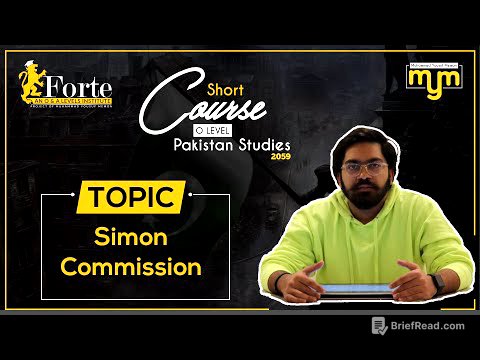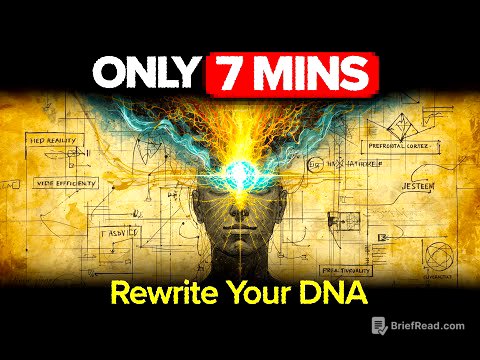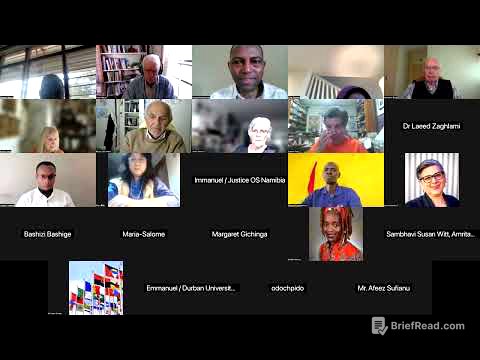TLDR;
This YouTube video features an in-depth interview with Reza Aslan, where he discusses the origins, evolution, and future of Islam, as well as his books "No God but God," "Beyond Fundamentalism," and "Zealot." Aslan explores the nature of religious interpretation, the relationship between religion and politics, and the historical context of various religious figures and texts. He also addresses common misconceptions about Islam and the challenges of religious extremism.
- The Islamic Reformation and the individualisation of Islam.
- The similarities and differences between Islam, Christianity, and Judaism.
- The importance of understanding the historical and political context of religious texts.
- The dangers of religious extremism and the need for interfaith action.
Police Zealot [0:00]
The discussion begins with the phrase "no god but God," which is the first part of the Muslim profession of faith, the Shahada. It's the phrase that initiates a convert into the Muslim faith. Aslan notes that Islam is undergoing a reformation, where every Muslim can now speak for Islam, a departure from the traditional authority of Islamic scholars.
The Islamic Reformation [0:05]
Aslan explains that Islam, like Judaism, is a legalistic religion that has historically relied on a class of scholars, the ulama, to interpret its meaning. However, this is evolving, mirroring the processes seen in other major religions. Prophets are reformers, not creators of new religions, and their followers must interpret their words and actions after they pass. This leads to the establishment of religious institutions and power structures, which in turn face challenges from individuals who perceive a gap between the institution's message and the prophet's original teachings. This clash between individuals and institutions defines the Reformation, concerning who has the authority to define faith.
Interpretation of Religion [4:17]
Aslan argues that religion is inherently about interpretation, and all interpretations are valid. Religious people often believe in one correct version of their faith, but scriptures require interpretation, influenced by personal, political, economic, and social views. While one interpretation may be more reasonable or historically accurate, there's no ultimate authority to declare one right and another wrong, except in highly centralised religions like Catholicism. This lack of central authority in Islam and Judaism leads to diverse interpretations and conflicts, especially evident in the Middle East.
Similarities Between Religions [8:18]
Mythically, the Talmud, Quran, and Bible represent a single prophetic history, where prophetic consciousness is passed from prophet to prophet. They share values, morals, and concepts of the afterlife and cosmos. These religions attempt to bridge the gap between humanity and God, with Jesus representing the Incarnate God in Christianity. Historically and morally, these Abrahamic faiths are intertwined.
Religion and Politics [11:23]
Aslan argues that religion and politics are inseparable, with religion being more about identity than beliefs and practices. For many, religious identity subsumes political, economic, and social views. He points out that Muhammad considered Jews and Christians as "people of the book," spiritual cousins with shared values. The early Muslim community created the concept of the "umma," an inclusive social organisation based on religious identification, including Jews and Christians. However, this inclusivity diminished after Muhammad's death, as scholars separated Islam from its parent religions.
Prophets as Reformers [18:11]
Aslan reiterates that prophets are reformers who redefine existing beliefs, not inventors of new religions. Religious people often struggle with this notion, preferring to believe their views are directly linked to the prophet and are static. However, there is no single "correct" religion; there are only diverse interpretations tied to cultural and political contexts. Islam, like Christianity, comes in many forms, varying across different regions.
The Historical Muhammad [21:18]
Muhammad was a member of a small clan within a significant tribe, an orphan who became a successful merchant. He was deeply spiritual, influenced by the pagan culture he grew up in. His revelations condemned economic and social disparity, promising judgment for the wealthy and protection for the marginalised. Pre-Islamic Arabia was awash with monotheistic religions, so Muhammad's message of one God wasn't new. The conflict arose from his condemnation of the economic and political situation, similar to Jesus's conflict with authorities.
Muhammad's Success and Christianity's Establishment [25:52]
Muhammad lived in the late 6th and early 7th centuries AD. Unlike many prophets who are seen as failures, Muhammad was successful, creating a state based on his revelations. This success, however, leads to suspicion among non-Muslims. Christianity was well-established by Muhammad's time, but it existed in multiple forms. Emperor Constantine converted to Christianity in the 4th century and sought to unify it, leading to the Nicene Creed. This resulted in the suppression of heterodox Christian communities, who then fled to the Middle East and Arabian Peninsula, influencing the religious landscape Muhammad encountered.
Constantine's Conversion and Early Life [28:12]
Historians debate whether Constantine's conversion to Christianity was political, but Aslan suggests taking Constantine at his word that he had a spiritual experience. Regardless, the move had political implications. Muhammad grew up in a world steeped in Jewish and Christian thought, which is why the Quran often repeats stories from the Hebrew Scriptures, assuming the audience is already familiar with them.
Reza Aslan's Background and "Zealot" [33:24]
Reza Aslan discusses his personal journey, from a lukewarm Muslim upbringing in Iran to becoming a committed Christian at age 15, and later a scholar of religions. His academic research led him to differentiate between the "Christ of faith" and the "Jesus of history," finding the latter more real and compelling. Despite leaving Christianity as a faith, he became obsessed with learning about the historical Jesus.
Religious Identity and Personal Faith [39:24]
Aslan clarifies that he doesn't accept sectarian designations, as studying world religions reveals they all express similar aspirations and use similar mythologies. While many religion scholars are atheists, Aslan is a person of faith who takes Islam as his "six-foot well," using its symbols and metaphors to understand his place in the world. His Muslim identity comes from accepting Islamic metaphors as a way to express the divine, but he acknowledges they are not more "true" than others.
The Sunni-Shia Split and Cosmic War [42:18]
The Sunni-Shia split, though historically significant, has become more pronounced recently due to political divides in the Middle East, stoked by internal and external forces for nationalistic gains. Iran and Saudi Arabia's cold war has exacerbated these tensions. Aslan warns against the idea that religious extremism can be controlled and used to one's advantage. He defines a "cosmic war" as a religious war where God is believed to be directly engaged, dividing the world into good and evil. This concept exists in many religions and can be traced back to the Torah.
Cosmic War and Islam [50:18]
Aslan refutes the idea that Islam inherently seeks to rule the world, stating that this notion is historically incorrect. He clarifies that the Quranic verse often cited to support this claim is historically contextual. He also points out that many Muslim countries are democracies, disproving the idea that Islam is anti-democratic. He argues that all religions, due to their reliance on absolutism, can be both anti-democratic and democratic, depending on interpretation. Ultimately, religion is what a religious person says it is, and interpretations vary widely.
Personal Life and Interfaith Understanding [55:44]
Aslan shares that his wife is Christian and his mother converted to Christianity, highlighting the love and acceptance he has experienced from devout evangelical Christians. He emphasizes that true Christianity is about inclusion, love, and compassion. He also stresses the importance of distinguishing between religion and faith, arguing that faith is mysterious and individualistic, while religion is the language that helps express it.
Religion as Identity and Interfaith Action [58:24]
Aslan discusses religion as a matter of identity, not just faith and practice, and the importance of not confusing religion with faith. He stresses that religion is a language of symbols and metaphors to express faith. He also highlights the need for interfaith action, not just dialogue, advocating for people of different faiths to work together on shared values like caring for those in need.
Zoroastrianism and Gender Inequality in Religion [1:18:11]
Aslan discusses Zoroastrianism, calling it one of the most important religions in history, and explains its key concepts like monotheism, angels and demons, and Heaven and Hell. He notes that it is a dying religion because it does not allow conversion. He also addresses the issue of gender inequality in religions, stating that religions are man-made and often interpreted in ways that benefit men.
Jihadism and the Quran [1:23:45]
Aslan clarifies that the sectarian conflict between Sunni and Shia has been exacerbated recently, not jihadism itself. He defines jihadism as a transnational movement seeking to reconstitute the world as a single caliphate, distinct from Islamism, which is a nationalistic ideology focused on creating an Islamic state. He stresses the importance of using the correct terminology to understand these movements and develop appropriate responses. He also quotes from his book, "No God but God," stating that the biggest obstacles to creating a genuine Islamic democracy are not only traditionalists or jihadist terrorists, but also those in the West who refuse to recognise that democracy cannot be imported.
Messiahs and the Gospels [1:28:43]
Aslan discusses why Jesus, among many messiahs, "stuck," attributing it to his social teachings and the actions of his followers after his death. He explains that the disciples changed the definition of Messiah to fit Jesus, which appealed to non-Jews. He also details the writing of the Gospels, emphasising that they were written by people who never met Jesus and are theological reflections, not eyewitness accounts.
The Gospels and Violence [1:35:57]
Aslan explains the prevailing theory about how the Gospels were written, starting with the hypothetical "Q" source and the Gospel of Mark, followed by Matthew and Luke, and finally the Gospel of John, each reflecting different stages of Christianity's development and separation from Judaism. He reiterates that all Gospels were written by people who never met Jesus and are theological reflections, not eyewitness accounts. He also addresses the question of whether Jesus advocated violence, noting that the kingdom of God is a call to revolution.
Political and Economic Standpoint [1:52:31]
Aslan addresses the question of how to reconcile Muhammad's actions in Medina with modern morality. He explains that the execution of the Banu Qurayza tribe was a political decision, not a religious one, based on their treason against the Constitution of Medina. He stresses the importance of understanding this event as a historical event, not a religious one.
Muslim Condemnation of Violence [2:10:56]
Aslan refutes the claim that Muslims do not forcefully speak out against violence, calling it a false statement. He cites numerous examples of Muslim statements and fatwas condemning violence, as well as a Gallup survey showing that Muslims are the religious community least accepting of violence in the name of religion.
Cosmic War and Jihadism [2:13:52]
Aslan warns against treating the war on terror as a cosmic war, arguing that it empowers radical militants by legitimising their worldview. He stresses the need to address the real grievances that fuel support for these groups and to recognise that jihadists are fighting a war of the imagination. He also clarifies that the Muslim Brotherhood is a nationalistic organisation, not an international one.
The Muslim Brotherhood and the Origins of Jihadism [2:32:25]
Aslan clarifies that the Muslim Brotherhood is not an international movement but rather a collection of nationalistic organisations focused on their respective nation-states. He contrasts this with jihadism, which is a transnational movement with a global agenda. He also discusses the origins of jihadism, tracing it back to Wahhabism and the Soviet invasion of Afghanistan, where the US supported the Mujahideen, leading to the rise of al-Qaeda.
Responding to Jihadism and the Nature of Faith [2:47:42]
Aslan outlines a two-pronged approach to responding to jihadism: addressing the legitimate grievances that fuel support for these groups and destroying the militants themselves. He stresses that jihadis are fighting a cosmic war and require a singular response: destruction. He also addresses emerging studies on the neuroscience of faith, arguing that the fact that faith can be linked to chemical processes in the brain does not negate the reality of the experience.
Skepticism and the Origins of God [2:53:20]
Aslan discusses his views on skepticism and the "new atheist" movement, arguing that skepticism can become an ideology and that the new atheism often exhibits fundamentalist tendencies. He also shares that he is working on a book about the origins and evolution of the concept of God, tracing it back 125,000 years.









